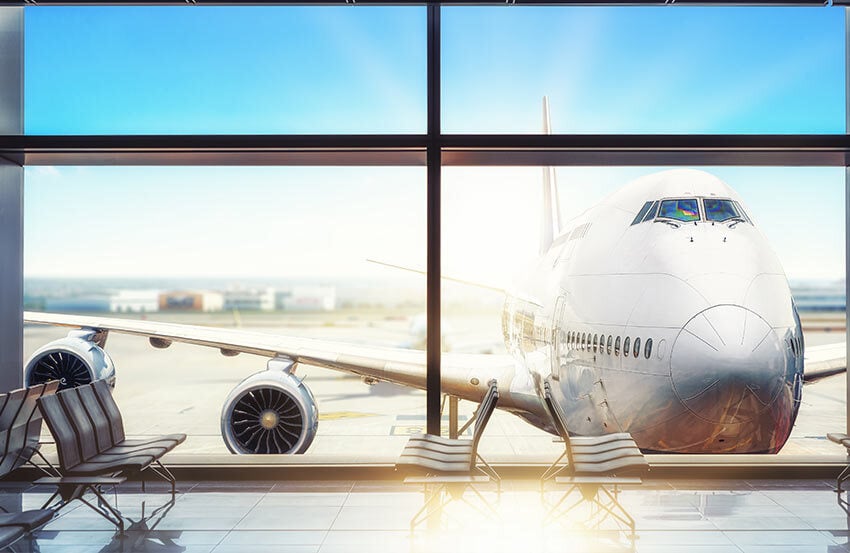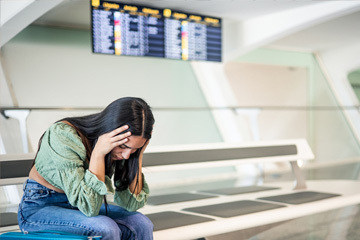Picture this: your airline suddenly goes out of business, leaving you without a flight or even stranded abroad. It's more common than you might think - 48 airlines went under in 2020 as a result of the Covid 19 pandemic!
Unlike a delayed or cancelled flight, this is where your entire airline goes into administration.
But, scheduled airline failure insurance (SAFI) can help. It can cover the cost of getting home or finding another flight if your airline collapses. Want to know more? Keep reading!

How does scheduled airline failure insurance work?
SAFI works by covering you if your airline goes bust. It's often included in premium travel insurance policies. Or, it can be added to standard travel insurance as an optional extra.
So, what can it cover in total? Well, this type of insurance generally includes:
- The cost of new flight tickets, up to an agreed limit
- The reimbursement of unused tickets
- The cost of flying home if your airline collapses while you’re abroad
- The replacement of your flights with alternative transport if flights aren't available
Head's up: Policies that include SAFI often cost more, but the price could be worth it for the peace of mind it brings.
Do I need scheduled airline failure insurance?
While SAFI can come in handy for some travellers, others might not need to worry about it at all.
Here's some other ways you could be protected if your airline goes bankrupt:
If your flight is ATOL protected
If your flight is covered through the Air Travel Organiser's Licence (ATOL) scheme, you won't need SAFI. Boom!
Let's break ATOL cover down:
ATOL protection kicks in if your holiday provider goes bust while at home or abroad. This means if you've booked a package holiday through a travel agency, you're likely covered. In this case, you wouldn't need to worry about SAFI cover because you'll already be covered through ATOL. Sorted.
Unsure if you've got this type of protection? No worries. The Civil Aviation Authority has a search directory you can use to check if your travel agency is an official ATOL partner.
If you paid by credit card
If you've paid for your flights by credit card, you also might not need SAFI. Thanks to Section 75 of the Consumer Credit Act, you should have some solid protection.
But, this only applies to flights over £100. It's also important to note that while you'll get your original payment back, this doesn't cover the cost of new flights. So, even though you'll get a refund, you'll need to pay for new flights if you're already abroad.
If you’re eligible for the chargeback scheme
The chargeback scheme could be a fallback option if your airline goes bust. It's similar to Section 75 protection. But, there's a few key differences to be aware of.
Here's how it works: If you paid for your flight using a debit or credit card, your bank could help you recover the money. This means that your bank will try to get the money back from the airline's bank. But, if the airline has gone into administration, you might end up on a list of creditors waiting for a refund. This can take a long time, and there's also no guarantee you'll get all of your money back, either.
So, if none of these apply to you or you simply want a little more reassurance, SAFI cover could be worth looking into.
Compare travel insurance
What’s end supplier failure insurance?
End supplier failure insurance is similar to SAFI, but it can offer broader protection for your entire trip.
Along with covering if your airline goes bust, end supplier failure can cover other essential parts of your trip that may fall through.
Here's some situations end supplier failure insurance can lend a hand:
- Coach and railway tickets
- Hotels
- Car ferries
- Villas
- Car and camper van hire
- Caravan sites
- Trips and safaris
- Theme parks
- Excursions
End supplier failure is sometimes included in standard travel insurance. But, it's usually offered as a policy add-on for a cost. So, just make sure to read the fine print of your policy. That way, you'll know what's included and what isn't.
How do I get these types of insurance?
You can sometimes get SAFI cover as part of your regular travel insurance. Or, it can be included as an optional extra for a fee.
Not sure if your policy includes it? Just follow these simple steps to check:
-
Pop over to our quote page. That way, you can compare travel insurance quotes.
- Click 'More info'. Select a policy that suits you. Then, you'll have the option to view more policy information.
- Look under 'Cancellation and travel.' Find this section and check to see if you have SAFI included. It's as simple as that!
But, here's the thing - this cover might not always be labelled specifically as 'Scheduled Airline Flight Failure'. Don't worry, just keep your eyes peeled for terms like 'flight cancellation ', or 'end supplier failure'. These generally offer similar protection.
If your policy doesn't include it, you should have the option to add SAFI cover during checkout. If you don't have the option to do this, you can contact your provider directly. They'll be happy to help!
Is there anything these types of insurance don't cover?
Yes. Here's some common situations that SAFI doesn't cover:
-
Booking your flights outside of the UK: If you've arranged your flights with a company based outside of the UK, SAFI typically won't cover any losses related to those bookings.
-
If the threat of failure was known before you took out your policy: If the possibility of the airline's failure was already public knowledge before you purchased your insurance, SAFI won't help. So, make sure to stay informed about the financial health of the airline before booking those flights.
-
Losses you can claim back with travel insurance: If you can claim compensation from another type of insurance, SAFI likely won't offer the same coverage. So, it's a good idea to review all of your insurance policies to see what's already covered.
-
Things that go wrong outside of the airline going bust: SAFI will only cover issues directly related to the airline going out of business. So, if you experience any consequential problems, like the cost of alternative accommodation, SAFI won't cover you.
It's important to be aware of the limitations of this insurance. That way, you'll have a better idea of what to expect if you find yourself dealing with an unexpected airline failure.
Top tip: If you're ever unsure about what your SAFI covers and excludes, contact your provider for clarity.
Simple ways to protect yourself against airline insolvency
Consider travel insurance
A comprehensive travel policy can include SAFI cover. If it doesn't, you should be able to purchase it as a policy add-on.
Check airline financial health
It's worth doing a quick search to see if the airline you're planning to book with has experienced any financial trouble recently. A few minutes of research can go a long way in avoiding potential problems!
Book with established airlines
Bigger and well-known airlines are generally more financially stable than smaller or newer ones. Choosing a reputable airline can reduce your risk of being affected by insolvency.
Consider package holidays
As mentioned, holidays often come with ATOL cover. This can protect you if your holiday provider goes under. It can also offer an extra layer of security alongside any other cover you might have, like travel insurance.







